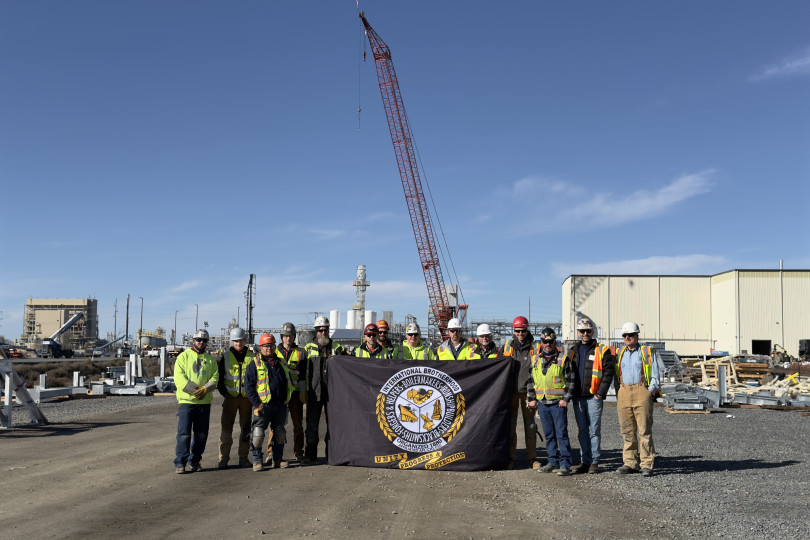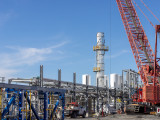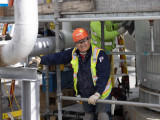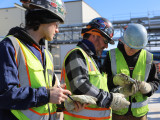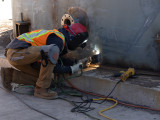This really is basically like a refining facility, but it’s refining new products… It’s great for us as a whole—away from what we’re used to in the old fossil fuels. It’s stepping into the future.
L-242 Boilermakers take a quick break to commemorate their work at the Sila battery materials plant in Moses Lake, Washington.
View Photo Gallery (5 photos)
Boilermaker work has evolved over more than a century from the union’s roots in steam-powered locomotives to shipbuilding, refineries, nuclear power plants, the latest pollution mitigation technologies and more. And while Boilermakers themselves have also evolved with industry changes, they’ve remained constant as the dependable, go-to welders, riggers and fabricators that steep the union’s history.
That’s what makes a recent Local 242 (Spokane, Washington) project both “new” news and old news at the Sila Nanotechnologies battery materials plant. The job is a move into a new industry for the Boilermakers; but for those on the job, it’s familiar work.
“I don’t think the scope of work—what a Boilermaker does—is really any different. It’s just the type of equipment and the process of that equipment that’s unique,” says International Rep Luke Lafley. “We’re still welding, we’re still rigging, we’re still doing layout, we’re still refabricating things that came in incorrectly.
“It’s normal Boilermaker work. It’s just the technology behind the equipment and the jurisdictional issues that come with it.”
As new industry territory, when Sila, a next-generation battery materials company, announced in 2023 that it was building out its first, auto-scale manufacturing plant in Moses Lake, Washington—and that they intended to use a local workforce—the opportunity for Boilermakers to build it could have been missed. Fortunately, L-242 Business Manager/Secretary-Treasurer Scott Widdicombe attends local Central Washington Building Trades council meetings, where he learned about the opportunity and about long-time contractor-partner Haskell’s plan to bid on the work.
“It’s important to go to your building trades meetings,” says Widdicombe, who participates in several area building trades groups. “If I had missed one building trades meeting or two meetings, we might not have been involved in this and it would have been playing a lot of catch up.”
In tandem with building trades involvement, he stresses the importance of the project labor agreements (PLAs) as integral to scoring the work with Haskell, working well with other craft affiliates and the project’s overall success.
“Without PLAs, we’re not getting this work. It’s the simple fact of the matter,” he says.
A PLA and early pre-job assignments made for a clear and smooth understanding of jurisdiction from the get-go, which all agree have eliminated inter-craft issues that can halt work, cause friction with contractors and employers and sour future work opportunities. At the Sila project, as Boilermakers work elbow-to-elbow with Ironworkers, Pipefitters and others, it’s been overall harmonious.
“We got all the stakeholders involved, all the parties, all the different business managers from all the different locals within the building trades of Central Washington, and as the scope developed, we got it agree to and signed, so there’s no drama, or minimal drama, in the field,” says Haskell Site Manager Luke Parham.
Parham describes the new Sila facility as essentially a chemical plant where Sila will make Titan Silicon (TM), an innovative material that enables a more efficient battery for the auto industry, consumer electronics and other future industries. That means the company is extremely cautious about its proprietary processes and plans—which includes first-of-its-kind equipment built by Boilermakers. It also means Silas’ engineers need to regularly tweak and refine original plans that they must hold tight to their chests right up until go-time. Haskell and the crafts all need to be ready to go and pivot as necessary, making the PLA and pre-job work even more critical—and challenging.
“There’s nothing to fall back on,” says L-242 Boilermaker and Site Superintendent Jayme Taylor, referring to the craft assignments and processes. “This is all brand new.”
The tone for fairness was set early in the pre-job phase. Job steward Mark Keffeler said that while Boilermakers claimed their work, they were also vocal about ensuring other crafts’ work was properly assigned.
“We’d say, ‘no, that’s ours; that’s theirs,’ and some guys were pretty new to the jurisdictional assignment process,” he explains. “[Scott Widdicombe and I] talked about it ahead of time, that if we’re fair from the start, we should be fair for the duration, and that’s really worked.”
In fact, Keffeler drives a shuttle van every day to and from the jobsite. His passengers: all Pipefitters.
“You know, we’ve got a new product line so to speak, and if we’re going to move forward getting this done with unions, we’ve got to do it professionally and safely. And that’s what Haskell and Sila have allowed us to do,” he says. “We don’t have to fight about piddly stuff. We might have to make concession here or there, but it’s better than watching across the fence while the work is done nonunion. We’re all getting along good in the sandbox.”
Boilermakers were assigned to the process vessels, air pollution mitigation equipment, reactors, flare stack, components for an auxiliary generator and work on a pressure transfer system for the product. Among highlights of their work at Sila, they set the thermal oxidizer and are building several substantial vessels including multiple massive tanks, some of which may be visible from the road.
“[The Boilermakers] have done an excellent job—high quality work on the tanks, the thermal oxidizer setting, and just constantly working through issues we’ve all experienced, whatever the case may be, to stay on schedule the best we can and pull things back in,” says Sila Construction Manager Shannon Denmark.
Adds Haskell’s Parham: “The craftsmanship here is what I’m used to in the Pacific Northwest, and that’s people show up rough and ready, staunch and steady, ready to go. They take pride in what they do, with Jayme all the way down to his crew.”
At its peak, the project employed 20 Boilermakers, which has meant a lot to local members who can commute back and forth for the job rather than leaving home for weeks and months. It’s also good for the local Moses Lake economy. Plus, it’s a significant foot in the door for future Boilermaker work in battery plants and other new industries.
“This really is, basically, like a refining facility, but it’s refining new products, and hopefully it’s on the forefront,” Taylor says. “Moving forward, it’s more work for the Boilermakers and for all crafts really. It’s a new process, and hopefully it takes off.
“It’s great for us as a whole—away from what we’re used to in the old fossil fuels. It’s stepping into the future.”
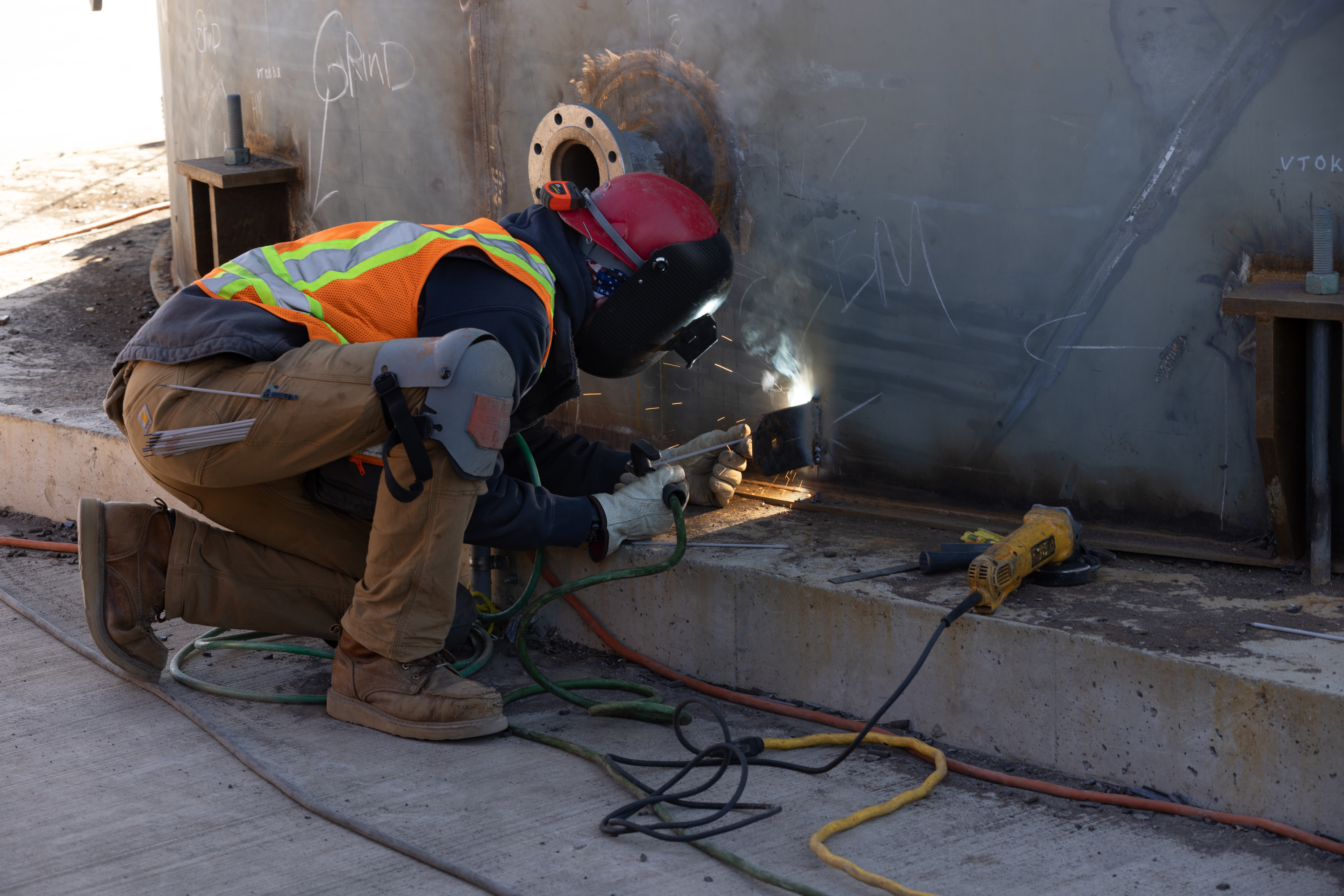
EXTRA: Watch this video interview with L-242 Boilermaker Apprentice Nez Ogle.
Apprentices learn at battery plant project
The Sila battery materials plant project has proved to be a great setting for Local 242 apprentices make their mark on a growing new industry, sharpen their skills and learn from seasoned journeymen.
For apprentice Nez Ogle, the experience has cemented his decision to become a career Boilermaker.
“It’s been really eye opening for me,” he says. “I’m learning everything that I’ve been wanting to learn.
Ogle went to welding school at Lewis-Clark State College and had an instructor who was a Boilermaker and talked about the union. So, when he finished school and wasn’t sure what to do next, he thought he’d give Local 242 a try.
“This job is a lot of fun. A lot of journeymen that are here are really helpful, and any question I ask them, they’re super helpful when answering my questions—and they’re really nice to me. So, it’s been awesome. I love it, and I think I’ll do this for the rest of my life.”
Journeyman Steven Pollard is among those working with apprentices like Ogle. He says the job has attracted quite a few apprentices, which makes the jobsite both interesting and challenging.
“You have to keep them with someone who can guide them, but it’s been good,” he says. “We have some really good apprentices coming in right now.”
Boilermaker Site Superintendent Jayme Taylor agrees.
“That’s our future. Those are the guys that are going to have to take over for me when I decide to retire,” he adds. “So, train them young, train them right and make sure they know what they’re doing.”
